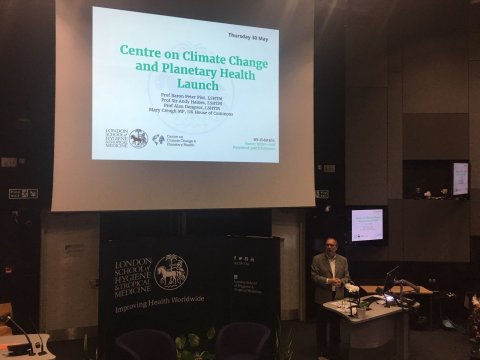LSHTM launches Centre on Climate Change & Planetary Health

Last week, the London School of Hygiene & Tropical Medicine launched their 14th virtual centre focusing on climate change and planetary health.
Professor Baron Peter Piot, Director of the School opened the event by stating the critical importance of mobilising millions of people to respond to the current climate emergency.
Addressing both policy and practical issues
According to Professor Piot, the Centre will address issues in climate change, both policy and practical issues. It will look to maximise expertise in-house and bring people together who are working on food security, agriculture, urban health, climate change and other areas.
One of the key issues mentioned at the launch was the difficulty in getting funding for work on climate change and planetary health, as multiple disciplines need to be engaged and represented and this means funding requests can fall between the gaps in remit of different funders.
The time to act is now
The most common myth is that planetary health and climate change is an issue for the long term only. It isn’t. The moment to act is now, which is why the Centre is being launched.
The field is very much in its infancy so the impact of climate change on health is not completely known as yet, hence the need to bring together experts to carry out academic research that goes beyond mathematical models.
Professor Piot then talked specifically about the School and how they are looking to reduce their environmental impact and carbon emissions. He said it can be done, but difficult choices need to be made and the process needs to be sped up.
Progress and challenges
Professor Sir Andy Haines then gave a brief overview of the Anthropocene era – a new epoch in which one species dominates the world and its resources.
He framed this as human triumph and progress but with huge challenges that we need to confront as we see increases in world population, GDP, primary energy use, fossil fuels, urbanisation, exploitation of fresh water as well as CO2, greenhouse gas, loss of tropical rainforest, acidification of ocean and biodiversity.
In terms of the impact on health, he highlighted a multitude of ways this happens such as through air pollution, severe heat, changes to the global food supply, reduced quality of water, mental health through loss of people’s home environment, increasing allergens and conflict migration.
More planetary health research needed
As with Professor Piot, he highlighted the need to reach out across disciplines and specifically focus more on planetary health research.
He spoke about the challenges to working on an issue such as planetary health. For example, the complexities of the systems, the delayed effects that make it hard to study or mean that funders aren’t interested, the necessity of it being trans-discipline and the inevitable policy silos.
Head of Centre, Professor Alan Dangour, then laid out what the Centre would be doing including looking at the impact of climate change on human health and how society adapts and can be more resilient.
Innovation, engagement, teaching and mentoring
He said that the Centre should show leadership in the field, and be inclusive, with as many people getting involved as possible, including early career researchers, senior researchers and policy leaders.
The centre will look at research innovation, broad engagement, teaching and mentoring. Some of its key priorities will include the design of sustainable and healthy cities, understanding and controlling the shifting patterns of infectious disease, the delivery of sustainable and healthy food systems under environmental change.
Sign up to our newsletter for more updates